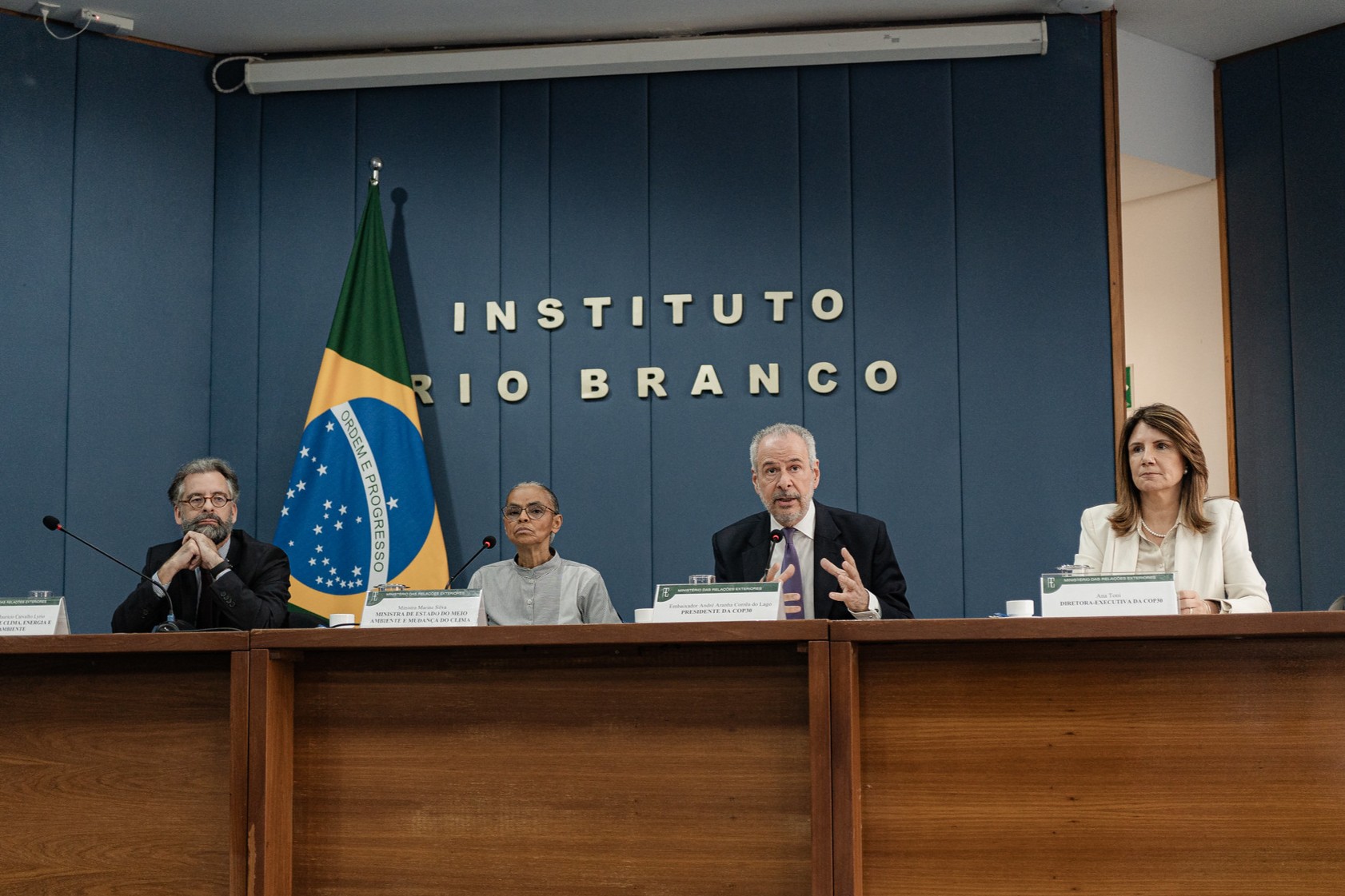Protection of Tropical Forests and Energy Transition Will Be Central to Leaders’ Summit Agenda
The Belém Climate Summit has already confirmed 143 delegations. The goal is to align commitments and lay the groundwork for the negotiations that will take place during COP30

By Flávia Gianini / COP30
The preservation of forests such as the Amazon, and mechanisms to make this goal viable—like the Tropical Forests Forever Fund (TFFF)—will be at the heart of discussions at the Climate Summit in Belém (Pará), scheduled for November 6–7, according to Brazilian authorities. Environment and Climate Change Minister Marina Silva, COP30 President Ambassador André Corrêa do Lago, and the Secretary for Climate, Energy, and Environment at the Ministry of Foreign Affairs, Ambassador Maurício Lyrio, presented Brazil’s main priorities for the event last Friday, the 31st, in Brasília (Federal District).
This gathering of world leaders sets the stage for COP30, which Brazil will host, also in the capital of Pará.
Amazon
Brazil chose the Amazon as the venue for COP30 to highlight the risk that the world’s largest tropical forest could reach a point of no return, leading to irreversible consequences for life on Earth. “The intention is that we do not neglect something that could mean the destruction of the conditions under which life was given to us,” said Minister Marina Silva. She reaffirmed Brazil’s commitment to zero deforestation by 2030 and a just energy transition.
Ambassador André Corrêa do Lago also emphasized that the Amazon is 75% urban—with cities, communities, and diverse ways of life—and that restoring the forest is not just about halting deforestation, but about generating solutions. This stance underscores the symbolic and ethical significance of choosing the region to host the event. “The world and Brazil itself will better understand the region through the presence of experts, students, and local communities during COP30. This will change the global perception of what the Amazon is today,” he added.
Brazil’s Commitments
According to officials at the press conference, Brazil reaffirms its commitment to zero deforestation by 2030 with COP30 and highlights that an ecological transformation plan is underway in the country. The use of transitional fuels like biodiesel and progress in clean energy were highlighted as key drivers of the energy transition agenda.
The government also stressed that climate action must be fair, taking into account the most vulnerable populations. Nearly 1,942 municipalities are in a state of permanent climate emergency due to droughts, floods, and other extreme events—underscoring the need for adaptation and resilience policies. In her speech, Marina Silva addressed the challenge of adapting the economy, stating that state-owned companies like Petrobras “must evolve from oil to clean energy companies.”
Tropical Forests Fund
During the press conference, the Tropical Forests Finance Facility (TFFF) was also mentioned—a financing mechanism in which the World Bank will act as the operator, but the priorities and rules will be defined by the forest-owning countries.
The mechanism will allocate part of its resources directly to Indigenous peoples and traditional communities, ensuring these groups play a leading role. According to its creators, the initiative represents “a new paradigm of governance for tropical forests.”
“This is a framework born within the Ministry of Environment, with support from the Ministry of Finance and the Ministry of Foreign Affairs, and it already has initial contributions from Brazil and Indonesia. The TFFF will allocate 20% of its resources directly to Indigenous peoples and local communities,” explained Marina Silva.
Ambassador André Corrêa do Lago emphasized the fund’s innovative nature: “The TFFF was born from the vision of countries that possess forests and understand their value. It is an extraordinary contribution that gives leadership to those who know best how to preserve them.”
Challenges Ahead
Notwithstanding the progress made thus far, the speakers acknowledged ongoing challenges. The approval of coal subsidies in Congress through Provisional Measure 304 was cited by the minister as being “contrary” to decarbonization efforts. Changes to the Access to Information Law that classify reservoirs and hydroelectric plants as strategic also raised concerns about potential impacts on environmental licensing.
Finally, the technical license granted by Ibama for oil exploration at the mouth of the Amazon River was also addressed. “The license granted is technical and includes conditions. Governance of the Amazon River mouth requires robust studies, as it is a little-known basin. Brazil is committed to the transition, but also to environmental responsibility,” Marina explained.
Toward the Leaders’ Summit
Ambassador Maurício Carvalho Lyrio stated that the Leaders’ Summit in Belém will bring together 143 delegations and over 170 accredited leaders, but it will not have a deliberative character or a final consensus document. The goal is to coordinate commitments and prepare negotiations for COP30.
Closing the press conference, Marina Silva summarized Brazil’s mission to the world: “COP30 in the Amazon is a call to global consciousness. Brazil wants to show that it is possible to grow, protect, and inspire the planet.”
See the full interview below:
Translation: Michel Emmanuel Félix François (POET/UFC)
Proofreading: Tadeu Azevedo (POET/UFC)
